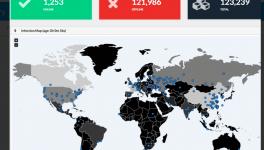The NSA's mass and indiscriminate spying on Brazilians
As it does in many non-adversarial countries, the surveillance agency is bulk collecting the communications of millions of citizens of Brazil
The National Security Administration headquarters in Fort Meade, Maryland. Whistleblower Edward Snowden worked as a data miner for the NSA in Hawaii.

Photograph: Jim Lo Scalzo/EPA
I've written an article on NSA surveillance for the front page of the Sunday edition of O Globo, the large Brazilian newspaper based in Rio de Janeiro. The article is headlined (translated) "US spied on millions of emails and calls of Brazilians", and I co-wrote it with Globo reporters Roberto Kaz and Jose Casado. The rough translation of the article into English is here. The main page of Globo's website lists related NSA stories: here.
As the headline suggests, the crux of the main article details how the NSA has, for years, systematically tapped into the Brazilian telecommunication network and indiscriminately intercepted, collected and stored the email and telephone records of millions of Brazilians. The story follows an article in Der Spiegel last week, written by Laura Poitras and reporters from that paper, detailing the NSA's mass and indiscriminate collection of the electronic communications of millions of Germans. There are many more populations of non-adversarial countries which have been subjected to the same type of mass surveillance net by the NSA: indeed, the list of those which haven't been are shorter than those which have. The claim that any other nation is engaging in anything remotely approaching indiscriminate worldwide surveillance of this sort is baseless.
As those two articles detail, all of this bulk, indiscriminate surveillance aimed at populations of friendly foreign nations is part of the NSA's "FAIRVIEW" program. Under that program, the NSA partners with a large US telecommunications company, the identity of which is currently unknown, and that US company then partners with telecoms in the foreign countries. Those partnerships allow the US company access to those countries' telecommunications systems, and that access is then exploited to direct traffic to the NSA's repositories. Both articles are based on top secret documents provided by Edward Snowden; O Globo published several of them.
The vast majority of the GuardianUS's revelations thus far have concerned NSA domestic spying: the bulk collection of telephone records, the PRISM program, Obama's presidential directive that authorizes domestic use of cyber-operations, the Boundless Informant data detailing billions of records collected from US systems, the serial falsehoods publicly voiced by top Obama officials about the NSA's surveillance schemes, and most recently, the bulk collection of email and internet metadata records for Americans. Future stories in the GuardianUS will largely continue to focus on the NSA's domestic spying.
But contrary to what some want to suggest, the privacy rights of Americans aren't the only ones that matter. That the US government - in complete secrecy - is constructing a ubiquitous spying apparatus aimed not only at its own citizens, but all of the world's citizens, has profound consequences. It erodes, if not eliminates, the ability to use the internet with any remnant of privacy or personal security. It vests the US government with boundless power over those to whom it has no accountability. It permits allies of the US - including aggressively oppressive ones - to benefit from indiscriminate spying on their citizens' communications. It radically alters the balance of power between the US and ordinary citizens of the world. And it sends an unmistakable signal to the world that while the US very minimally values the privacy rights of Americans, it assigns zero value to the privacy of everyone else on the planet.
This development - the construction of a worldwide, ubiquitous electronic surveillance apparatus - is self-evidently newsworthy, extreme, and dangerous. It deserves transparency. People around the world have no idea that all of their telephonic and internet communications are being collected, stored and analyzed by a distant government. But that's exactly what is happening, in secrecy and with virtually no accountability. And it is inexorably growing, all in the dark. At the very least, it merits public understanding and debate. That is now possible thanks solely to these disclosures.
Disclaimer: The views expressed here are the author's personal views, and do not necessarily represent the views of Newsclick
Get the latest reports & analysis with people's perspective on Protests, movements & deep analytical videos, discussions of the current affairs in your Telegram app. Subscribe to NewsClick's Telegram channel & get Real-Time updates on stories, as they get published on our website.
























